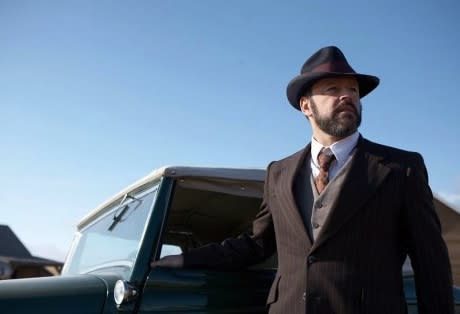By now, the cinematic notion that all corporations are evil and greedy, making victims of good people, is a given. It's the sort of thing that's implied by the sheer virtue that the arts are closely tied with liberal, or communist, thinking.
This is why creating an admonitory about the horrors of Western society and the vulture-like nature of banks and capitalist systems is a bit of a redundancy. Since it's omnipresent anyways, doting on it, or relying on it for narrative crux, is a bit of a, "well, duh" situation.
Perhaps this is why David Mortin's weirdly insular, almost inert period drama, Mad Ship, is so astoundingly inconsequential. It's based on the true story (sort of) of Norwegian immigrants Tomas (Nikolaj Lie Kass) and Solveig (Line Verndal) in '20s Western Canada, doing their best to achieve the advertised North American dream when the 1929 drought and economic crash leave them in a shitty situation.
The bank, an ill-defined, somewhat implausible organization represented only by the manager, Cameron (Gil Bellows), decides to foreclose on their farm, which forces Tomas to seek work elsewhere, while Solveig stays at home with the kids and reluctantly agrees to the commodification of her body.
Because the couple is identified only through a few weepy, Harlequin farmhouse stills in an embrace — when not represented via flashback in front of an ocean (Norway being little more than a hill and a waterfront in the context of this film) — it's hard to care about their separation or the outcome.
Since Mad Ship is set-up as a finger-wagging session, pointing out that the crisis of today isn't exactly something new for Western society (you mean, we don't learn from history?), the inevitable breakdown and stripping away of all dignity and sanity are little more than inevitabilities.
Though the actual story and assemblage of characters are far too twee and superficial to work in any emotional capacity, all of the lead actors, in particular Verndal and Kass, do deliver very emotionally raw performances. Their disappointment and eventual shift from love and understanding to blame and hostility is conveyed subtly and intelligently, which is aided by Mortin's languid direction and the washed-out, Earthy colour palette.
It's just unfortunate that nothing about the story, or film, is handled with any semblance of uniqueness or passion. There's an overall humdrum feeling of forced characterisations and situations to fit a very bland and redundant social assertion.
Sadly, this makes for a dull and disconnected viewing experience.
(D Films)This is why creating an admonitory about the horrors of Western society and the vulture-like nature of banks and capitalist systems is a bit of a redundancy. Since it's omnipresent anyways, doting on it, or relying on it for narrative crux, is a bit of a, "well, duh" situation.
Perhaps this is why David Mortin's weirdly insular, almost inert period drama, Mad Ship, is so astoundingly inconsequential. It's based on the true story (sort of) of Norwegian immigrants Tomas (Nikolaj Lie Kass) and Solveig (Line Verndal) in '20s Western Canada, doing their best to achieve the advertised North American dream when the 1929 drought and economic crash leave them in a shitty situation.
The bank, an ill-defined, somewhat implausible organization represented only by the manager, Cameron (Gil Bellows), decides to foreclose on their farm, which forces Tomas to seek work elsewhere, while Solveig stays at home with the kids and reluctantly agrees to the commodification of her body.
Because the couple is identified only through a few weepy, Harlequin farmhouse stills in an embrace — when not represented via flashback in front of an ocean (Norway being little more than a hill and a waterfront in the context of this film) — it's hard to care about their separation or the outcome.
Since Mad Ship is set-up as a finger-wagging session, pointing out that the crisis of today isn't exactly something new for Western society (you mean, we don't learn from history?), the inevitable breakdown and stripping away of all dignity and sanity are little more than inevitabilities.
Though the actual story and assemblage of characters are far too twee and superficial to work in any emotional capacity, all of the lead actors, in particular Verndal and Kass, do deliver very emotionally raw performances. Their disappointment and eventual shift from love and understanding to blame and hostility is conveyed subtly and intelligently, which is aided by Mortin's languid direction and the washed-out, Earthy colour palette.
It's just unfortunate that nothing about the story, or film, is handled with any semblance of uniqueness or passion. There's an overall humdrum feeling of forced characterisations and situations to fit a very bland and redundant social assertion.
Sadly, this makes for a dull and disconnected viewing experience.
